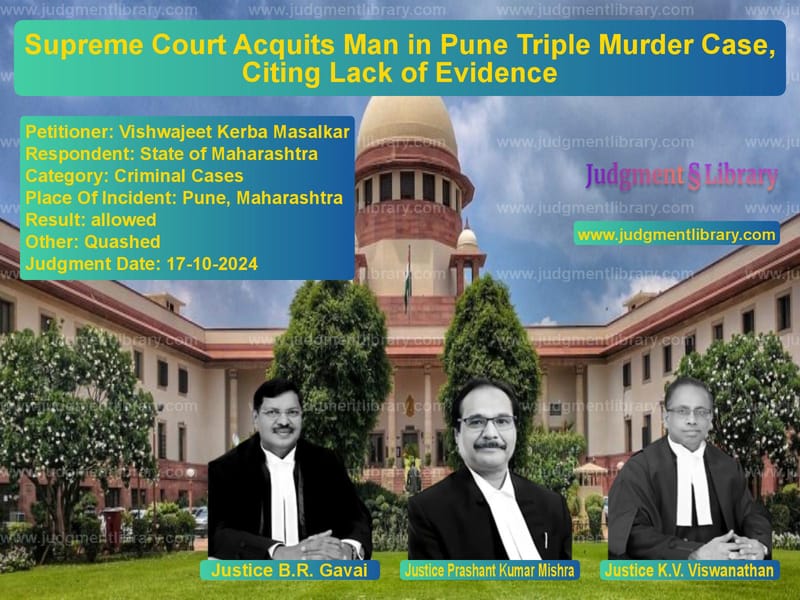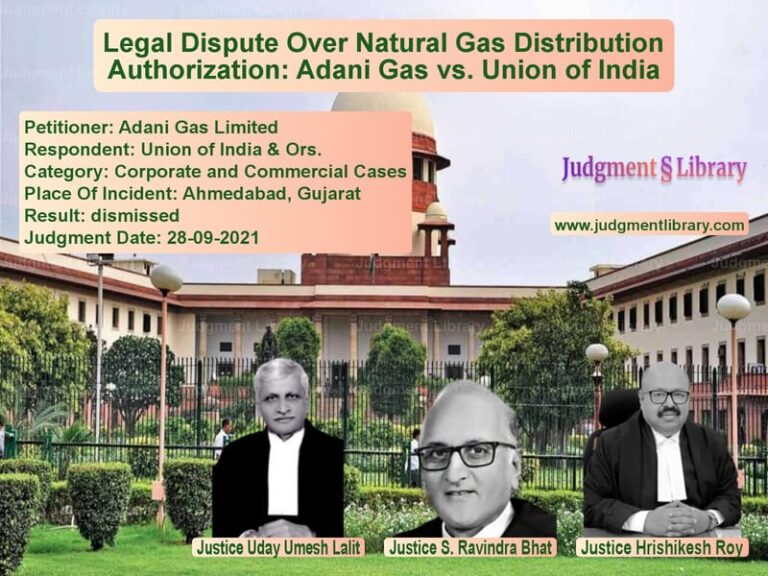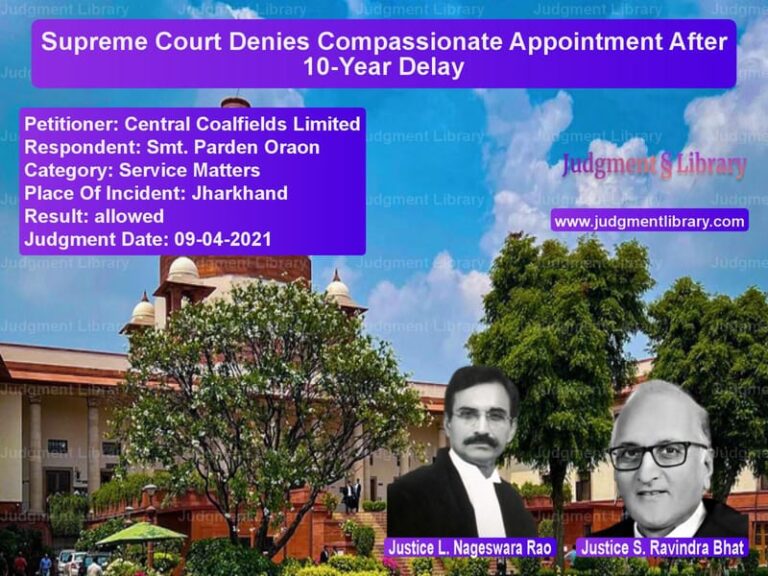Supreme Court Acquits Man in Pune Triple Murder Case, Citing Lack of Evidence
The case of Vishwajeet Kerba Masalkar vs. State of Maharashtra is a significant Supreme Court ruling on the standards of evidence required for a conviction in a criminal case. The judgment, delivered on October 17, 2024, overturned the conviction and death sentence imposed on the appellant, citing serious lapses in the prosecution’s case and lack of conclusive evidence.
Background of the Case
The case revolved around the brutal murder of three family members—Shobha Masalkar (mother), Archana Masalkar (wife), and Kimaya Masalkar (two-year-old daughter) of the appellant on October 4, 2012, at their residence in Pune. The appellant had called the police, alleging that a robbery had taken place at his home and that his family members were killed during the incident. However, upon investigation, the appellant himself was arrested on October 5, 2012, on suspicion of committing the murders.
The prosecution built its case primarily on circumstantial evidence, including the testimony of an injured neighbor, forensic reports, CCTV footage, and alleged recoveries made at the appellant’s instance. The trial court convicted the appellant under Sections 302 (murder), 307 (attempt to murder), and 201 (causing disappearance of evidence) of the Indian Penal Code (IPC) and sentenced him to death. The Bombay High Court confirmed the death sentence.
Petitioner’s Arguments
- The defense contended that the entire case was based on circumstantial evidence and lacked direct proof.
- The key witness, a neighbor, had inconsistencies in his statements and his testimony was recorded belatedly after six days.
- The alleged murder weapon, a hammer, was recovered from a canal days after the incident, raising doubts about its reliability as evidence.
- Forensic evidence did not conclusively establish the appellant’s involvement.
- The High Court failed to consider that an accused must be proven guilty beyond a reasonable doubt and that strong suspicion alone cannot result in a conviction.
Respondent’s Arguments
- The prosecution maintained that the appellant had a clear motive—his desire to marry another woman, which led to a dispute with his wife and mother.
- The neighbor, who was injured in the attack, identified the appellant as the perpetrator.
- The appellant’s behavior following the incident was suspicious, and his own complaint to the police was an attempt to mislead the investigation.
- The CCTV footage established his presence at the crime scene, and the recoveries corroborated the prosecution’s version.
Supreme Court’s Observations
- The Court found serious inconsistencies in the prosecution’s case, particularly regarding the testimony of the injured witness.
- It observed that the witness’s statement was recorded six days after the incident without explanation, casting doubts on its reliability.
- The recovery of the hammer from a canal was deemed unreliable, as it was unlikely to retain forensic evidence after being submerged for several days.
- The forensic evidence was inconclusive and did not directly link the appellant to the murders.
- The CCTV footage only showed the appellant leaving the building and did not capture the crime itself.
- The Court reiterated the principle that suspicion, however strong, cannot replace proof beyond reasonable doubt.
Supreme Court’s Ruling
- The Court set aside the conviction and death sentence imposed by the trial court and confirmed by the High Court.
- It ruled that the prosecution failed to establish guilt beyond a reasonable doubt.
- The appellant was ordered to be released from custody unless required in any other case.
- The judgment emphasized that courts must exercise extreme caution in death penalty cases and ensure that convictions are based on unimpeachable evidence.
Legal Implications of the Judgment
This ruling has significant implications for criminal law and evidentiary standards:
- Reaffirming the Presumption of Innocence: The Court reiterated that an accused is presumed innocent until proven guilty beyond a reasonable doubt.
- Stricter Standards for Circumstantial Evidence: The judgment highlights the necessity of a complete chain of evidence to eliminate all reasonable doubts.
- Ensuring Fair Trials: The decision reinforces the importance of procedural fairness, including timely recording of witness statements and proper forensic analysis.
- Judicial Prudence in Death Penalty Cases: The ruling underscores that courts must be extremely cautious before confirming a death sentence.
Conclusion
The Supreme Court’s decision in this case serves as a reminder that strong suspicion alone cannot substitute for proof beyond a reasonable doubt in criminal trials. By acquitting the appellant, the Court has reinforced the fundamental principles of justice and fair trial, ensuring that capital punishment is applied only in cases with irrefutable evidence.
Petitioner Name: Vishwajeet Kerba Masalkar.Respondent Name: State of Maharashtra.Judgment By: Justice B.R. Gavai, Justice Prashant Kumar Mishra, Justice K.V. Viswanathan.Place Of Incident: Pune, Maharashtra.Judgment Date: 17-10-2024.
Don’t miss out on the full details! Download the complete judgment in PDF format below and gain valuable insights instantly!
Download Judgment: vishwajeet-kerba-mas-vs-state-of-maharashtra-supreme-court-of-india-judgment-dated-17-10-2024.pdf
Directly Download Judgment: Directly download this Judgment
See all petitions in Murder Cases
See all petitions in Bail and Anticipatory Bail
See all petitions in Judicial Review
See all petitions in Legal Malpractice
See all petitions in Judgment by B R Gavai
See all petitions in Judgment by Prashant Kumar Mishra
See all petitions in Judgment by K.V. Viswanathan
See all petitions in allowed
See all petitions in Quashed
See all petitions in supreme court of India judgments October 2024
See all petitions in 2024 judgments
See all posts in Criminal Cases Category
See all allowed petitions in Criminal Cases Category
See all Dismissed petitions in Criminal Cases Category
See all partially allowed petitions in Criminal Cases Category







